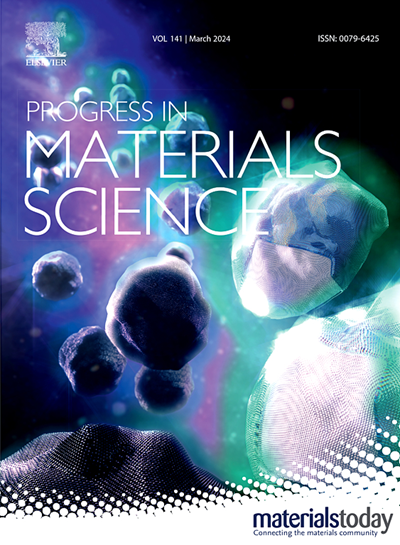Direct ink writing of aerogels: Fundamentals, strategies, applications, and perspectives
IF 40
1区 材料科学
Q1 MATERIALS SCIENCE, MULTIDISCIPLINARY
引用次数: 0
Abstract
Aerogels, which can be made from virtually any material, are exceptional examples of multifunctional materials. They hold great promise for interdisciplinary science across physics, chemistry, and biology, etc. However, their inherently fragile structure poses significant challenges to traditional manufacturing processes. Additive manufacturing—commonly known as 3D printing—has emerged as a novel approach for shaping aerogels, among which great attention has been paid to the Direct Ink Writing (DIW) technology for its convenience, versatility and accessibility. Unfortunately, the universal application of DIW technology in aerogel shaping remains a challenge, largely due to the absence of specialized rheological designs and advanced DIW strategies. Consequently, this review primarily focuses on the rheological behavior of aerogel-based inks to elucidate the fundamentals of aerogel DIW. Next, this review presents some advanced DIW strategies from the ink toolkit expansion, printing process modification to ingenious posttreatment. Also, the impressive applications of aerogel DIW are introduced. Lastly, a comprehensive view of the development of aerogel DIW is concluded and proposed. The review summarizes the fundamental theory, recent progresses and challenges on aerogel DIW, aiming to provide the state-of-the-art concept and theoretical guidance for the next generation of aerogel DIW.
气凝胶的直接墨水书写:基本原理,策略,应用和观点
气凝胶几乎可以由任何材料制成,是多功能材料的特殊例子。它们对跨越物理、化学和生物等学科的跨学科科学有着巨大的希望。然而,它们固有的脆弱结构对传统制造工艺构成了重大挑战。增材制造-通常被称为3D打印-已经成为一种新型的气凝胶成型方法,其中直接墨水书写(DIW)技术因其便利性,通用性和可及性而备受关注。不幸的是,由于缺乏专门的流变设计和先进的DIW策略,DIW技术在气凝胶成型中的普遍应用仍然是一个挑战。因此,本文主要关注气凝胶基油墨的流变行为,以阐明气凝胶DIW的基本原理。接下来,本文从油墨工具箱的扩展、印刷工艺的修改到巧妙的后处理等方面介绍了一些先进的DIW策略。此外,还介绍了气凝胶DIW的应用前景。最后,对气凝胶DIW的发展进行了全面的总结和展望。本文综述了气凝胶DIW的基本理论、最新进展和面临的挑战,旨在为下一代气凝胶DIW提供最新的概念和理论指导。
本文章由计算机程序翻译,如有差异,请以英文原文为准。
求助全文
约1分钟内获得全文
求助全文
来源期刊

Progress in Materials Science
工程技术-材料科学:综合
CiteScore
59.60
自引率
0.80%
发文量
101
审稿时长
11.4 months
期刊介绍:
Progress in Materials Science is a journal that publishes authoritative and critical reviews of recent advances in the science of materials. The focus of the journal is on the fundamental aspects of materials science, particularly those concerning microstructure and nanostructure and their relationship to properties. Emphasis is also placed on the thermodynamics, kinetics, mechanisms, and modeling of processes within materials, as well as the understanding of material properties in engineering and other applications.
The journal welcomes reviews from authors who are active leaders in the field of materials science and have a strong scientific track record. Materials of interest include metallic, ceramic, polymeric, biological, medical, and composite materials in all forms.
Manuscripts submitted to Progress in Materials Science are generally longer than those found in other research journals. While the focus is on invited reviews, interested authors may submit a proposal for consideration. Non-invited manuscripts are required to be preceded by the submission of a proposal. Authors publishing in Progress in Materials Science have the option to publish their research via subscription or open access. Open access publication requires the author or research funder to meet a publication fee (APC).
Abstracting and indexing services for Progress in Materials Science include Current Contents, Science Citation Index Expanded, Materials Science Citation Index, Chemical Abstracts, Engineering Index, INSPEC, and Scopus.
 求助内容:
求助内容: 应助结果提醒方式:
应助结果提醒方式:


